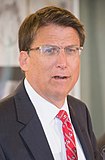North Carolina gubernatorial election, 2016
|
|
|||||||||||||||||
|---|---|---|---|---|---|---|---|---|---|---|---|---|---|---|---|---|---|
|
|||||||||||||||||
|
|||||||||||||||||

|
|||||||||||||||||
|
|||||||||||||||||
The 2016 North Carolina gubernatorial election was held on November 8, 2016, to elect the Governor of North Carolina, concurrently with the 2016 U.S. presidential election, as well as elections to the United States Senate and elections to the United States House of Representatives and various state and local elections.
Primary elections were held March 15. Both major party candidates won their primaries by overwhelming margins.
Incumbent Republican Governor Pat McCrory was running for re-election to a second term in office.Roy Cooper, the incumbent Attorney General of the state (and the second-longest-serving Attorney General in North Carolina history), was the Democratic nominee. Lon Cecil, a consultant and electrical engineer, was the Libertarian nominee. The gubernatorial race was expected to be among the most competitive in the country in 2016.
On election night, the race was too close to call, with Cooper leading by fewer than 5,000 votes out of more than 4.6 million cast. That lead has since widened to 10,263 votes.
Cooper claimed victory that night, with thousands of provisional ballots still yet to be counted, saying "We have won this race." However, McCrory refused to concede, claiming that the race was still too close to call and the winner had not yet been determined. He cast doubt on the authenticity of 90,000 late-arriving votes from Durham County, which put Cooper in the lead. McCrory's campaign filed complaints alleging voter fraud in over 50 counties. Both campaigns anticipated a protracted legal battle over the results.
...
Wikipedia


